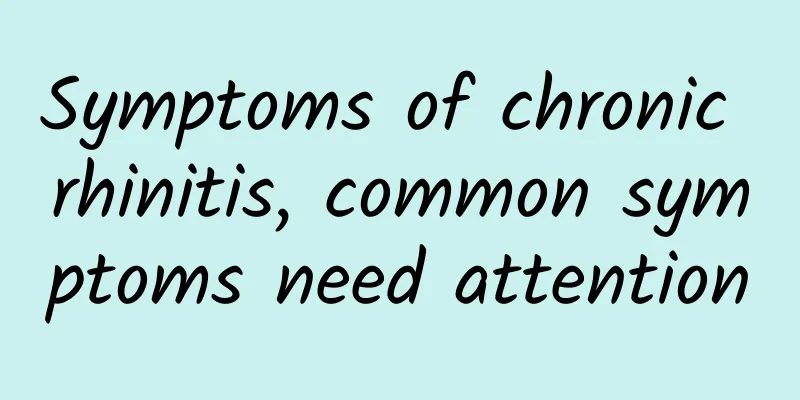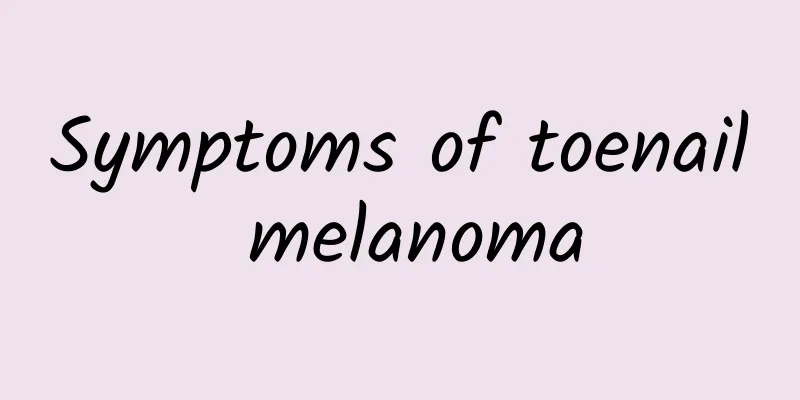Symptoms of chronic rhinitis, common symptoms need attention

|
Chronic rhinitis is difficult to cure. Chronic rhinitis is divided into simple rhinitis and hypertrophic rhinitis. The most important thing for patients with chronic rhinitis is daily care. They should quit smoking and drinking, avoid eating cold, spicy and greasy foods, and eat more foods rich in vitamin B and vitamin A. 1. Common symptoms Chronic simple rhinitis: The nasal mucosa is swollen, the surface is smooth, moist, and generally dark red. The nasal concha mucosa is soft and elastic. Light pressure with a probe may cause a depression, but the depression will quickly recover when the probe is removed, especially in the inferior turbinate. If 1-2% ephedrine solution is used to shrink the nasal mucosa, the nasal concha will shrink rapidly, and there will be mucous or purulent secretions in the common nasal meatus or inferior nasal meatus. Chronic hypertrophic rhinitis: ① The inferior turbinate is significantly enlarged, or both the inferior and middle turbinate are enlarged, which often leads to nasal obstruction and mucous or mucopurulent secretions at the bottom of the nasal cavity or the inferior nasal meatus. ② The mucosa is swollen, pink or purple, with an uneven surface, or nodular or mulberry-shaped, especially at the front end of the inferior turbinate and its free edge. There is no obvious depression when the probe is pressed lightly, and it feels hard to the touch. ③After local application of vasoconstrictors, mucosal contraction is not obvious. 2. Care of chronic rhinitis 1. Avoid smoking: The harmful substances in cigarettes can directly irritate the respiratory tract, and the smoke will cause harm to the health of people around, so tobacco should be completely eliminated. 2. Avoid cold food: Cold food will irritate the stomach and intestines, so in order to better recover, you should eat less or not eat it. 3. Avoid fried and spicy foods, such as chili peppers, onions, raw garlic, pepper, etc. 3. Diet for chronic rhinitis 1. For hypertrophic rhinitis, it is advisable to eat aromatic foods that can open the orifices, promote diuresis and eliminate moisture, such as coriander, ginger, onion, leek, shepherd's purse, coix seed, water chestnut, lentil, red bean, lotus seed, etc. 2. For atrophic rhinitis, it is advisable to: eat more foods rich in vitamins A, B2, C, E, and niacin, eat more fresh vegetables and fruits, and eat more iron-containing foods. In clinical practice, the use of iron supplements to treat atrophic rhinitis has an effective rate of about 75%. This shows that for patients with atrophic rhinitis with low serum levels, eating more iron-containing foods will definitely be effective. 3. Patients with chronic rhinitis should eat more foods rich in vitamin A and vitamin B to supplement the body's needs. Fruits and vegetables, such as citrus, apricots, pineapples, carrots, tomatoes, rapeseed, amaranth, animal liver, eggs, milk, etc., are rich in vitamin A and carotene, and carotene can be converted into vitamin A after entering the human body. Vitamin B is mainly found in lean meat and animal liver, coarse grains, brown rice, millet, cornmeal and buckwheat noodles. |
<<: What causes stomach pain and back pain
>>: The difference between allergic rhinitis and sinusitis is the easiest to distinguish
Recommend
What causes favism?
Favism is actually a hereditary disease that can ...
Effects of ginger and angelica root
Ginger and Angelica dahurica are relatively commo...
Can the yellow on the head of crayfish be eaten?
Many people eat lobsters with the head. People wh...
Treatment of chronic pharyngitis
As environmental pollution becomes increasingly s...
Leukopenia
White blood cells, also called leukocytes, are a ...
What vitamins are lacking in anemia?
Anemia may be congenital or acquired. There are m...
What is the cause of the small white pimples in the eyes?
Pimples are not unfamiliar to many people. Pimple...
The efficacy and function of Tribulus terrestris
Speaking of caltrops, everyone knows that they we...
What to do if pregnant women have inverted breasts
If a pregnant woman has inverted nipples, she wil...
Potassium persulfate compound brine aquaculture
One of the better advantages of potassium persulf...
What are the reasons why men fart a lot? These four are the most common
If a man farts a lot, he should know more about t...
What are the dietary precautions for patients with facial paralysis?
Patients with facial paralysis must pay close att...
Superior cerebellar artery
Every tissue structure in the human brain is very...
When can autism be detected?
If you want to detect autism, you must judge by s...
Can incontinence be cured?
Incontinence is also a common disease nowadays. I...









